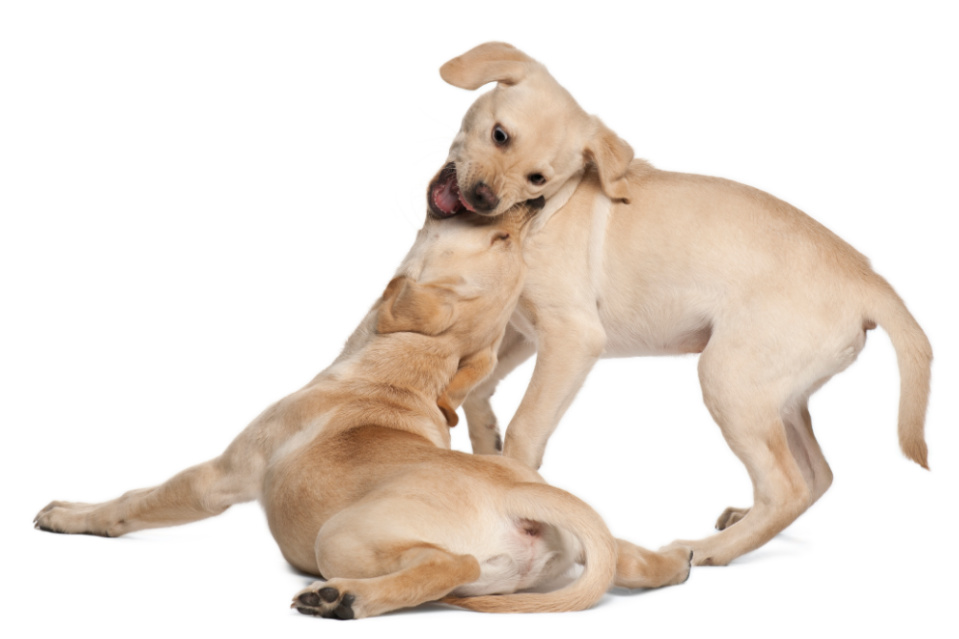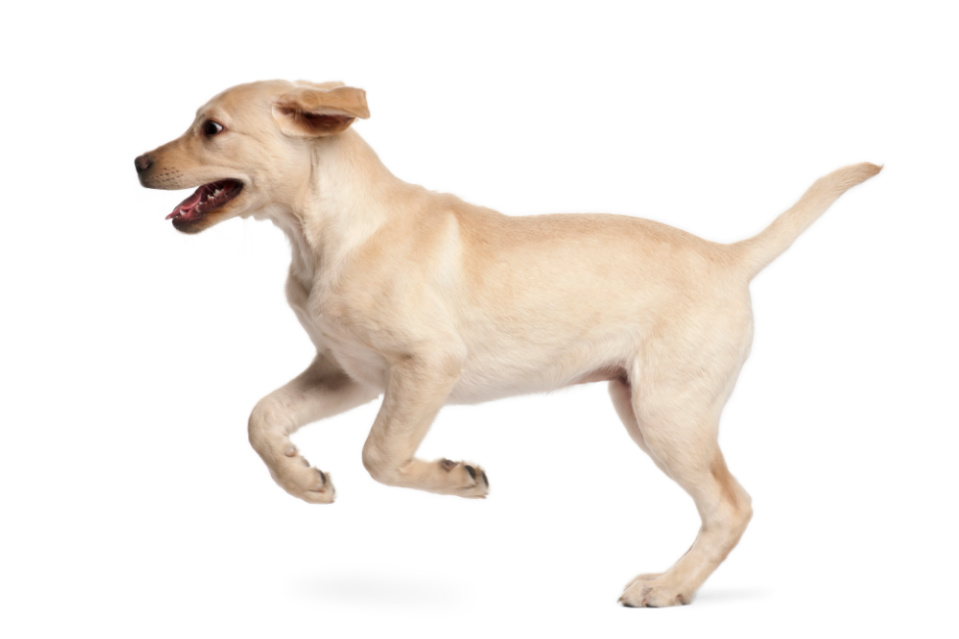Labrador Retrievers are generally sweet and kind dogs. However, almost every owner may say that their canine companion has displayed common Labrador behavior problems at one point or another, which caused them to lose patience with their Lab.
To help you address these seemingly common Labrador behavior problems, here is everything you need to know about what causes them and how to fix them.
Let’s get into it.
What causes common Labrador behavior problems?
The causes of Labrador behavior problems often depend on what kind of behavior problems your Lab displays, their personality, genetics, as well as experiences in life.
This is especially true when you consider that there may be differing Labrador behavior by age.
However, there are a handful of common causes of behavioral issues in Labradors.
Boredom, for example, is a very common cause. Labradors have lots of energy and are very smart.
If they feel like they have nothing to do, they may start chewing up pillows, being where they should not be, or digging holes in your backyard, among other things.
These instances may be so problematic for you that you may end up wondering how to discipline your Lab puppy.
Another huge reason why your Labrador is acting differently may also be because of a lack of exercise.
Labradors are big, energetic dogs that need to burn their energy. Otherwise, you may find yourself asking at what age do Labradors calm down.
When your Lab does not get enough exercise, they will be more likely to break things or disobey you. It may also result in a Labrador biting problem.
Stress can also make your Labrador have a sudden change of behavior. They may start to look scared, shake, hide, or display other Labrador behavior problems that they normally do not show.
Another reason behind your Labrador Common Behavior Problems
May also be a traumatic or scary experience that your Labrador Retriever has had.
This experience may have led to them having depression, post-traumatic stress disorder, separation anxiety, and the like.
For instance, your Lab may have been involved in an accident that would cause them to be scared of and react violently to loud, sudden, or high-pitched noises.
Furthermore, any Labrador behavior problem that you believe your beloved pet is exhibiting may be a result of something wrong or something new in your Lab’s routine or health.
These may include sudden dietary changes that they may not be comfortable with, lack of sleep, feeling pain, or an underlying illness.
Additionally, one other possible reason for your Labrador behavior problems may be that your you have too high expectations for your dog.
Most of the time, it’s not that Labradors behave badly intentionally. It may only be that their general sense of fun gets them into trouble that they may mean common Labrador behavior problems for you.
For example, you may believe that your Lab puppy is “hyper” when the truth is that they are merely engaging in behaviors that come naturally to them.
Since they don’t instinctively understand morals the way human beings see them, your Labrador Retriever may not really know that they are behaving badly.
What type of Labrador common behavior problems may your dog develop?
Scavenging
It would not be unusual if your dog sniffs the kitchen floor to look for fallen pieces of food while you cook.
However, it can be a problem if your Lab starts to dig through the trash and make a mess to look for food.
It would be hard to completely get rid of this habit because it is in a dog’s nature to scavenge for food. However, you can curb this habit and decrease it.
First, you have to make sure that you never let your dog eat off of the floor.
Whenever you feed them, make sure their food is in their bowl. When you hand them food like treats, do not drop it onto the floor. Instead, hand it directly to their mouths.
Additionally, you will want to try preparing some preventative measures.
For example, if your Labrador always goes through the trash, you can get a trash can that has a cover that you can clip shut.
You can also hide your trash can in a cupboard so they cannot reach it.
Aggression

While Labs normally have sweet personalities, it is possible for them to show symptoms of aggressive behavior.
Common symptoms of aggression include growling, barking, biting, and showing their teeth.
Typically, it comes from abuse, trauma, and past experiences. How you deal with it will normally depend on the severity of their symptoms and what caused it.
Positive reinforcement and establishing dominance is an excellent way to help treat mild symptoms.
However, you may need to see a specialist if your Lab shows severely aggressive behavior.
Chewing
Chewing will be a very common Labrador behavior for nearly all dogs, especially when they are puppies.
Sometimes, it may only be that they are teething, as they often stop this habit when they have their adult teeth or when you train them.
However, uncontrollable chewing that wrecks your furniture and other belongings is going to be a common Labrador behavior problem that you will have to learn how to deal with.
You can control their chewing by showing them what are the acceptable things they can chew, such as their toys.
Whenever they chew the right things like toys, you can give them treats to reward them.
You can also make sure they get enough exercise. If your dog has too much extra energy, they will find other ways to release it, like chewing your stuff.
Getting them enough exercise every day can help get rid of the temptation to chew.
Excessive barking
Dogs bark to communicate. However, excessive barking can be an issue for you, your family, your neighbors, and more.
Your Lab may bark whenever they want your attention. Therefore, they might bark excessively if they lack attention.
A simple way to help them feel more loved is by keeping them inside more often.
Dogs that are outside the house and alone often feel lonely and will bark to grab your attention.
You can also close your curtains if your dog barks at people walking down the street.
Begging
Labradors are hungry dogs that love food. However, that makes them more likely to beg for food every time you try to eat, which can be bothersome.
To stop them, you should never give them food that you are eating. If you give them bites to eat while you are at the table, they will always come back for more.
You should also redirect them when they beg to sit near you or lay down next to your feet.
Digging
Remember how Labs are smart? Well, they get bored quickly and will find a way to keep themselves entertained.
Luckily, keeping them indoors with lots of toys can easily stop them from wanting to dig in your yard.
Jumping up

You may have found it extremely cute before when your Lab puppy would jump on your legs to get your attention and bite or nip your hand.
However, it may be a lot more painful and bothersome now that they are fully grown adults.
First, you should make sure to stay calm and not get mad at your Lab when you tell them to stop. Otherwise, they may think that you do not appreciate their greetings.
What you can do instead is to redirect their behavior. This method is especially good to start teaching them when they are young.
When they see you enter a room, tell them to sit and stay until you let them get up. Once they get up, you can pet them and hug them.
If they try to do this to other people, tell the person to turn away and to discourage their behavior.
It will help your Lab learn that they do not need to jump on people to say hello.
Sometimes, though, it is normal
As we mentioned earlier, it is important to remember that sometimes, “bad behavior” is not as bad as you think.
Your Lab may just be acting the way they do because they do not know what is right or wrong until you teach them.
For instance, scavenging and digging are natural instincts for dogs.
So, if they start to do that, you have to teach them that it is wrong. Otherwise, they will not realize that they should not do it.
Again, remember that if your Lab does something “bad”, it doesn’t mean they are a bad dog.
More importantly, it is your job to teach them what they can and cannot do.
Labrador Retrievers are generally very easy to train, so you can easily rectify any common Labrador behavior problem.
All you need is a little patience.
All in all
Learning what causes your dog’s bad behavior can help you learn how to avoid it.
We have suggested some tips above that you can take note of to know how to stop common Labrador behavior problems when they arise.
However, keep in mind that some common Labrador “behavior problems” may actually just be because they are following their natural tendencies.
If you need these behavior problems in your Lab changed, you have to make sure that you train them out of it.







